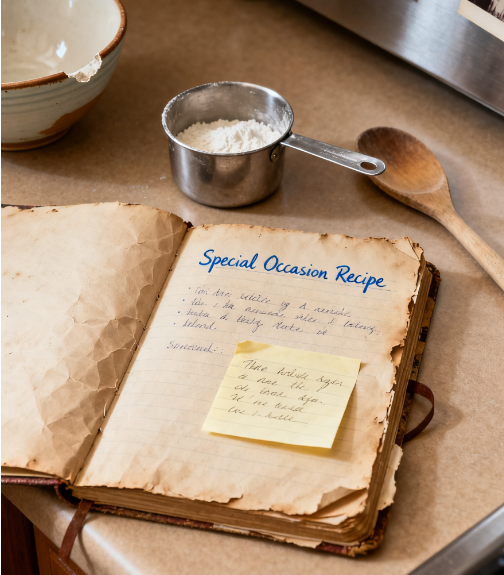
The recipe was a monument in your family, a dish that marked the landscape of your life together. It appeared for anniversaries, promotions, and those rare, perfect Sundays when the world felt soft and kind. For you, it was “Michael’s Lasagna”—a rich, deeply layered masterpiece, simmered for hours, its recipe card stained with drops of red wine and nostalgia. It was his signature, his offering, his edible proof of love. You’d watched him make it a hundred times, his movements a familiar, comforting dance.
Then, on a Tuesday, your world tilted.
You were looking for the deed to the car in his old filing cabinet, a place you rarely ventured. Behind a folder of expired insurance policies, your fingers brushed against a small, cloth-bound notebook. Curiosity piqued, you opened it. It was filled with your husband’s handwriting, but the words weren’t his. They were recipes. And there, on the third page, was the lasagna. But the title, written in his careful script, was not “Michael’s Lasagna.”
It was “Gabe’s Lasagna.”
Gabe. A name you’d never heard. A cold knot tightened in your stomach. Who was Gabe? A secret mentor? A ghost from a past life he’d never mentioned? The familiar recipe suddenly felt like a borrowed treasure, a beautiful lie you’d been consuming for years.
That evening, as he seasoned the tomato sauce for a casual dinner, you leaned against the counter, the notebook in your hand. “I was looking for the car deed today,” you said, your voice carefully light. “I found this.”
You watched his shoulders stiffen. He didn’t turn around, just kept stirring the simmering pot. The silence stretched, filled only by the bubbling of tomatoes and your own pounding heart.
“Who is Gabe?” you finally asked.
He let out a long, slow breath, as if releasing a weight he’d carried for decades. He turned, and his eyes were not guilty, but filled with a profound and ancient sorrow.
“Gabriel,” he said softly. “My younger brother.”
You stared, bewildered. “You don’t have a brother.”
“I did,” he whispered. The story that tumbled out was one of a grief so deep it had been buried alive. Gabriel, two years younger, vibrant, funny, and wildly creative. He was the artist, the cook, the free spirit in a family of pragmatists. He’d come out to the family when he was eighteen. Their father, a hard, unyielding man, had thrown him out. Michael, then twenty and desperate for their father’s approval, had stood by and let it happen. It was the great, un-forgiven sin of his life.
A year later, Gabriel was gone. A car accident. He died alone, hundreds of miles from home.
“He sent me this notebook a month before he died,” Michael said, his voice cracking. “He’d written down all the recipes we used to make together. This lasagna was his masterpiece. He wrote, ‘So you don’t forget the taste of home, even if I’m not there.’”
He looked at you, his face raw with a pain you had never seen. “I cook it for you on our happiest days because… because it’s my penance. It’s my way of asking him to be here, to see the life I built, to meet the woman I love. It’s my way of saying I’m sorry, to a ghost who can’t hear me.”
The recipe they cook for your special occasions was taught by someone you’ve never met because that person is a beloved ghost, a brother who never got a seat at the table. The lasagna wasn’t a lie. It was a seance. Every layer of pasta, every sprinkle of cheese, every slow-simmered hour was a prayer, a ritual of remembrance and regret. The love you tasted in it was not diminished; it was multiplied. It was no longer just Michael’s love for you. It was also his enduring love for the brother he lost, and his desperate, hopeful love for the forgiveness he still seeks. From that day on, when you sit down to that sacred meal, you now set a place, in your heart, for Gabriel.